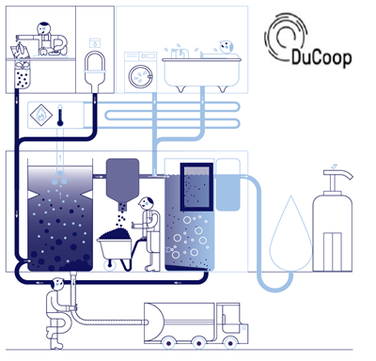PR 00233: verschil tussen versies
Geen bewerkingssamenvatting |
Geen bewerkingssamenvatting |
||
| Regel 47: | Regel 47: | ||
{{Project config}} | {{Project config}} | ||
{{Project | {{Project | ||
|Name=NEREUS Resource Recovery from Wastewater | |||
|Supercontext=Water Technology | |Supercontext=Water Technology | ||
|Start date=2018/08/27 | |Start date=2018/08/27 | ||
|End date=2020/06/30 | |End date=2020/06/30 | ||
| Regel 55: | Regel 54: | ||
The overall project runs until June 2020 but students are needed to help with work in every semester up until that time. | The overall project runs until June 2020 but students are needed to help with work in every semester up until that time. | ||
|Show summary=Ja | |Show summary=Ja | ||
|Contact person=CNTR 00043 | |||
|Show extra=Ja | |||
|Show navigation tree=Ja | |Show navigation tree=Ja | ||
|Show new page button=Nee | |Show new page button=Nee | ||
| Regel 63: | Regel 64: | ||
|Show edit button=Ja | |Show edit button=Ja | ||
|Show VE button=Ja | |Show VE button=Ja | ||
|Show sidebar=Nee | |||
|Show category label=Nee | |Show category label=Nee | ||
|Show title=Ja | |Show title=Ja | ||
|Project type=Standaard | |||
|Create process and content pages=Nee | |Create process and content pages=Nee | ||
}} | }} | ||
Versie van 21 apr 2020 11:04
About this project
Goal of the project
The main goal of this project is to develop a mathematical framework for finding the most feasible technology or sequence of technologies for recovering specific resources from various urban wastewater streams.
Link with theme's Energy, Water and Vitality
Central to the mathematical model is the recovery of resources including thermal and chemical energy and water.
Professorships and/or organizations involved
This project is part of the PhD research from Wageningen University and Research, which is financed partly by the NEREUS (New Energy and Resources from Urban Sanitation) project and partly by HZ University of Applied Sciences. The NEREUS project falls under the Interreg 2 Seas program 2014-2020 co-funded by the European Regional Development Fund under subsidy contract No 2S03-011.
Role and ambition of stakeholders involved
The ambition within the NEREUS project is to develop a decision support tool that can help various stakeholders to find the optimal technical solution for resource recovery from urban wastewater in decentralized concepts.
What's in it for me?
Activities and design of the project
- Literature study
- Mathematical modeling
- Validation and optimization of the model
Results to be developed
- Mathematical model for decision making
Which skills you can develop in this project
- A very general understanding of wastewater management and the multi-disciplinary aspects of decision making;
- In depth understanding of applied mathematics in decision science;
For which study programs or fields of interest is this project suitable?
- applied mathematics
- operational research
- IT
- environmental technology
- water technology
Knowledge and skills desired or required
- mathematical modelling
- programing
- process engineering
How you will be supervised
This project is provided by the Water Technology research group here at HZ University of Applied Sciences and you will be supervised by researcher/lecturer, MSc Maria van Schaik with support from senior lecturer, dr. ir. Hans Cappon.
Practical information
- Start and duration: Semester 1 (Start September 2019) and Semester 2 (Start February 2020) 2019-2020
- Language: English
- Credits: 30 ECTS for Minor, Internship or Graduation
- Minimum grade: 5.5 (out of 10)
- Contact: for information about the project: MSc Maria van Schaik, maria.van.schaik@hz.nl or dr. ir. Hans Cappon, hans.cappon@hz.nl.
References
- Bixio, Davide et al. 2006. “Wastewater Reuse in Europe.” Desalination 187(1–3):89–101.
- Drosg, Bernhard et al. 2015. Nutrient Recovery by Biogas Digestate Processing. Retrieved (http://www.iea-biogas.net/files/daten-redaktion/download/Technical Brochures/NUTRIENT_RECOVERY_RZ_web1.pdf%5Cnhttp://www.iea-biogas.net/files/daten-redaktion/download/Technical Brochures/NUTRIENT_RECOVERY_RZ_web2.pdf).
- Hamouda, M. A., W. B. Anderson, and P. M. Huck. 2009. “Decision Support Systems in Water and Wastewater Treatment Process Selection and Design: A Review.” Water Science and Technology 60(7):1767–70.
- Holmgren, Katrin Eitrem, Hong Li, Willy Verstraete, and Peter Cornel. 2014. “State of the Art Compendium Report on Resource Recovery from Water.”
- Khiewwijit, Rungnapha. 2016. New Wastewater Treatment Concepts towards Energy Saving and Resource Recovery -PhD Thesis.
- Muga, Helen E. and James R. Mihelcic. 2008. “Sustainability of Wastewater Treatment Technologies.” Journal of Environmental Management 88(3):437–47.
- Roeleveld, I. P., D. Roorda, and M. Schaafsma. 2010. “NEWs: THE DUTCH ROADMAP FOR THE WWTP OF 2030.”

